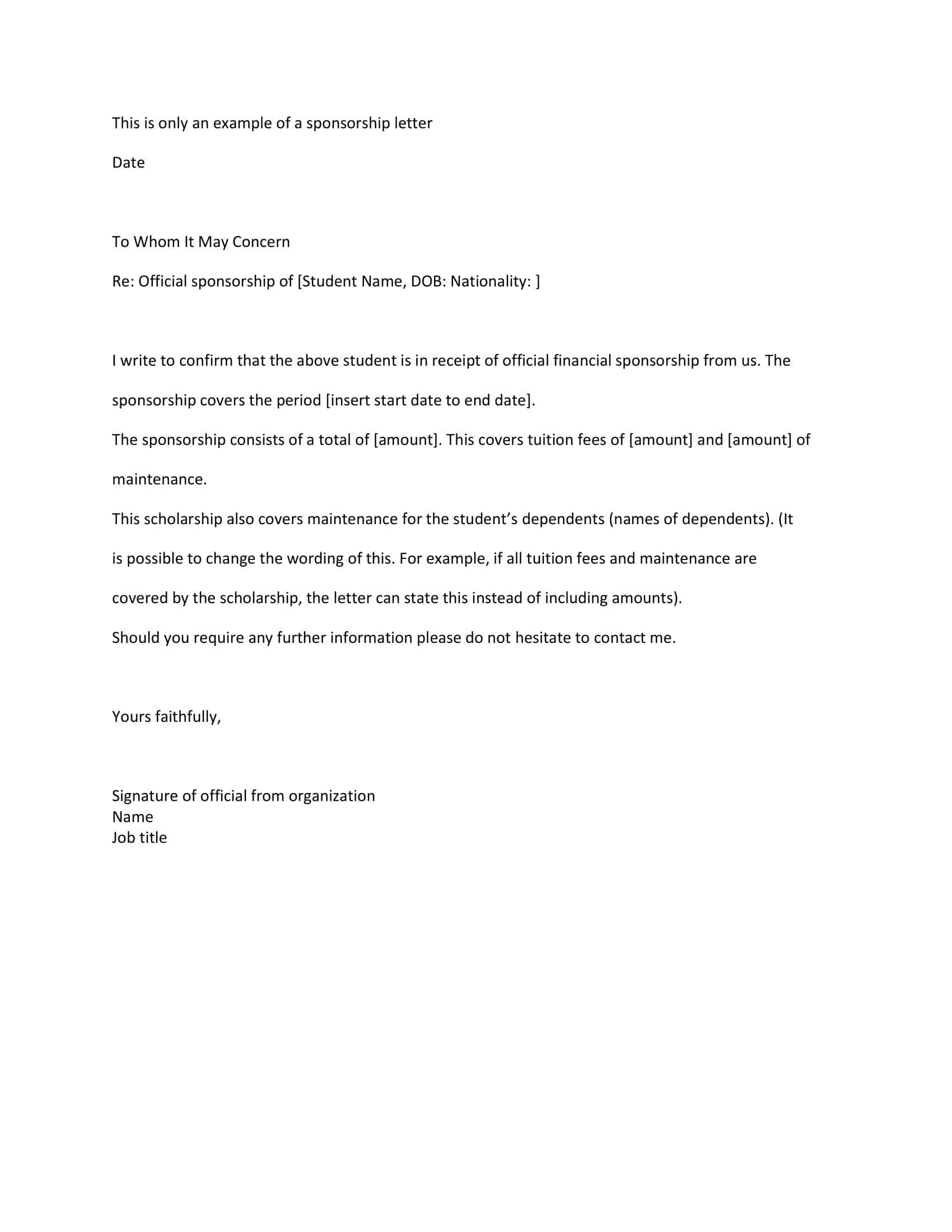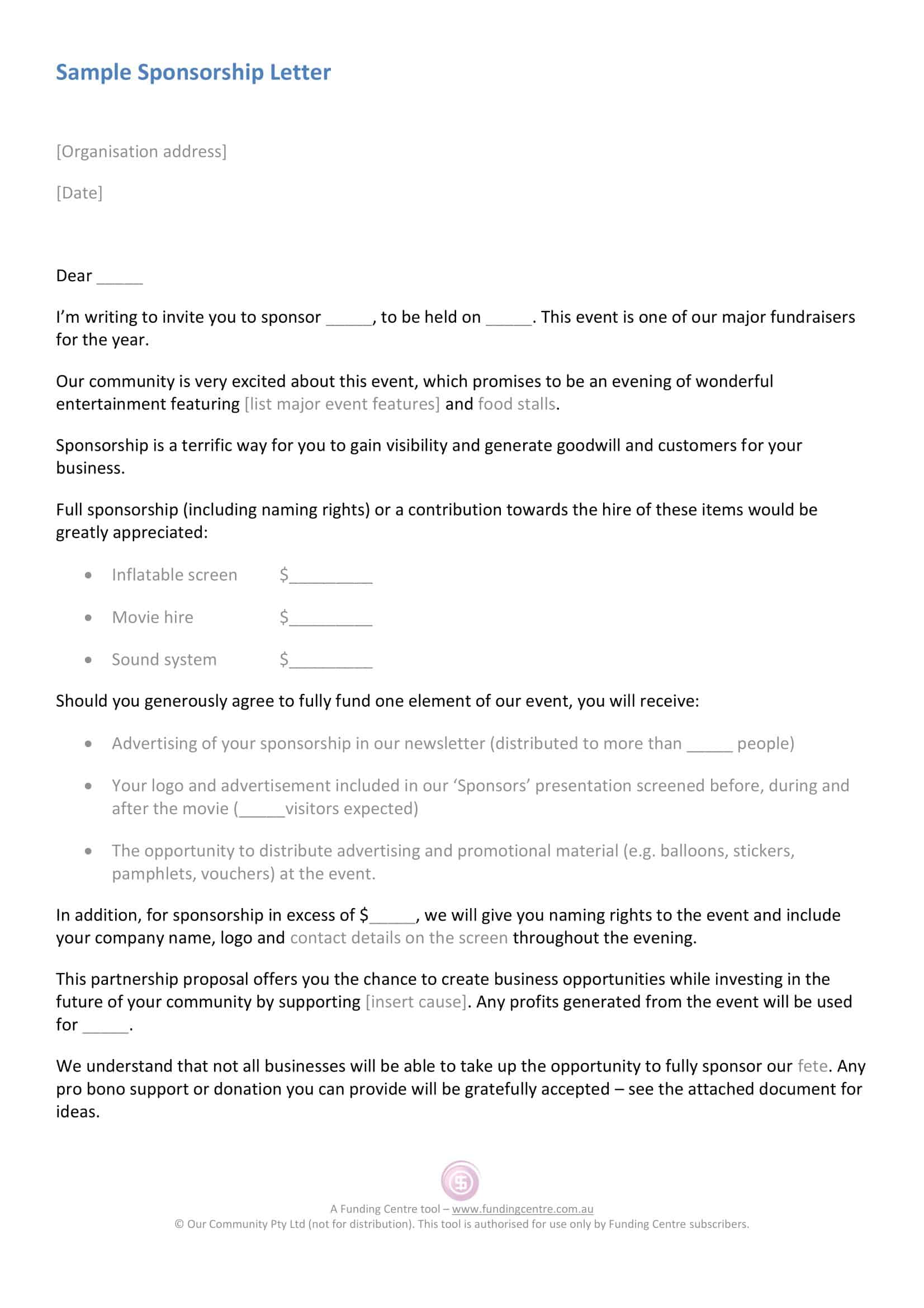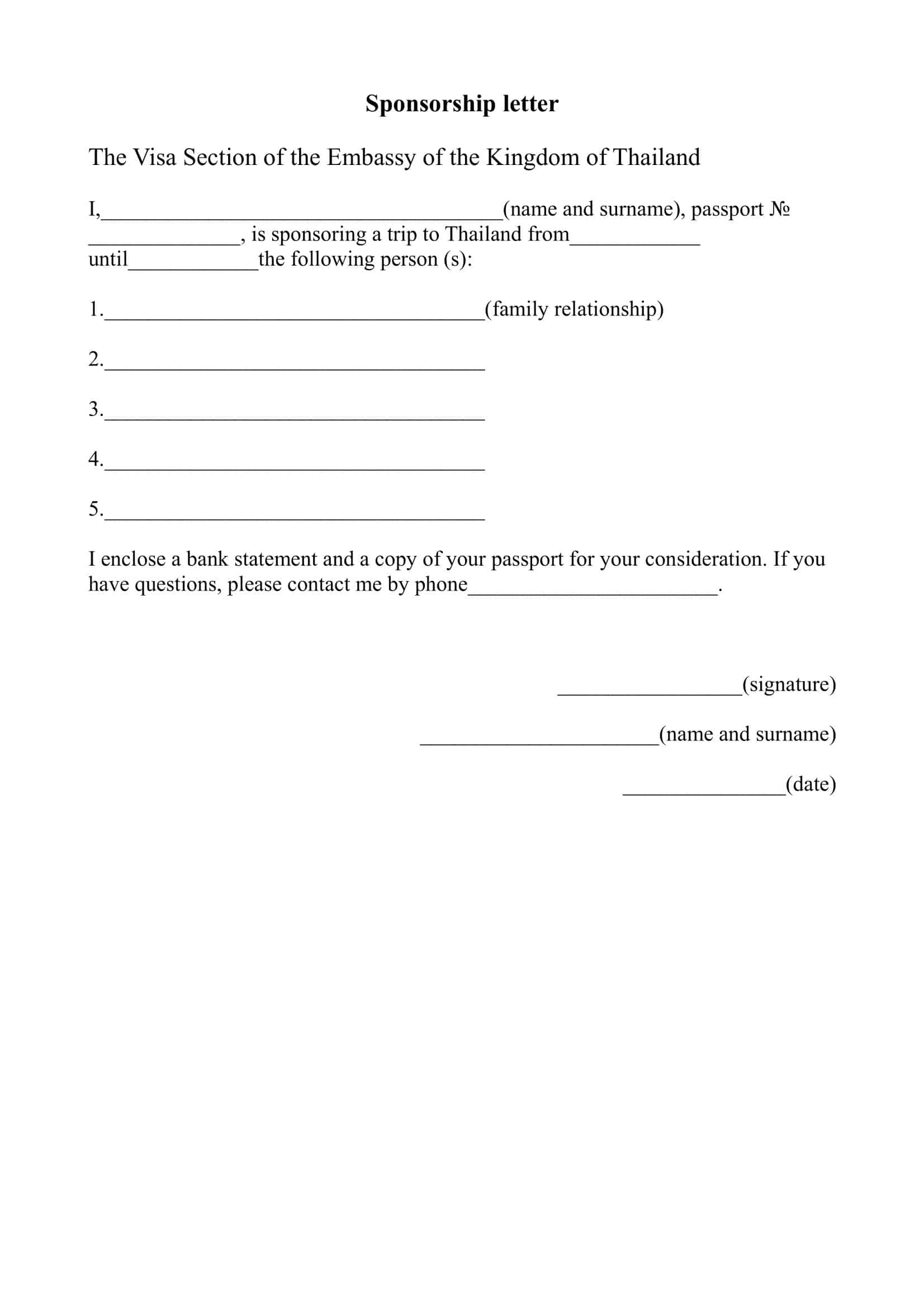Are you seeking funding for an event, competition, or tour? A sponsorship letter or proposal is a powerful tool that can help you secure the necessary funds to make your event a success. Many businesses, big and small, are happy to support their local community by sponsoring events. Even if you don’t have a well-known organization, a strong sponsorship letter can help you get the funding you need and establish credibility for your project or event.
Table of Contents
Sponsorship Letter Templates
Sponsorship plays a pivotal role in modern business and community endeavors, offering a powerful avenue for organizations to connect with potential sponsors who share their values and goals. A sponsorship letter, also known as a sponsorship proposal or request, serves as a crucial tool in this process, allowing businesses, nonprofits, and individuals to effectively communicate their initiatives, needs, and opportunities for partnership. This description delves into the world of sponsorship letter templates, exploring their significance, structure, and the myriad benefits they bring to both sponsors and recipients.
Sponsorship letter templates provide a structured and efficient approach to seek support and forge successful partnerships. By utilizing these templates and following best practices, organizations can convey their vision, attract sponsors, and unlock new opportunities that drive their initiatives forward. Whether seeking financial backing or in-kind support, sponsorship letters serve as powerful tools in fostering mutually beneficial relationships between sponsors and recipients.
What Is a Sponsorship Letter?
![Free Printable Sponsorship Letter Templates [PDF, Word, Excel] Visa, Event 1 Sponsorship Letter](https://www.typecalendar.com/wp-content/uploads/2023/03/Sponsorship-Letter.jpg 1414w, https://www.typecalendar.com/wp-content/uploads/2023/03/Sponsorship-Letter-212x300.jpg 212w, https://www.typecalendar.com/wp-content/uploads/2023/03/Sponsorship-Letter-724x1024.jpg 724w, https://www.typecalendar.com/wp-content/uploads/2023/03/Sponsorship-Letter-768x1086.jpg 768w, https://www.typecalendar.com/wp-content/uploads/2023/03/Sponsorship-Letter-1086x1536.jpg 1086w)
A sponsorship letter is a written request for financial or in-kind support from a business or organization. It is typically used by individuals or organizations to secure funding for events, competitions, or tours. The letter is usually accompanied by a sponsorship proposal, which provides details about the event or project and outlines the benefits of sponsoring it.
The goal of a sponsorship letter is to persuade the recipient to support the event or project and to encourage them to take action, such as providing financial assistance or donating materials or services. Sponsorship letters are commonly used in the sports, arts, and non-profit sectors, but they can also be used by individuals or businesses seeking support for personal projects or ventures.
Choosing the Best Companies to Approach for Sponsorship
When seeking sponsorship for an event or project, it is important to approach businesses that align with the goals and values of your event or project. For example, if your event is focused on sustainability, you may want to consider approaching eco-friendly companies or organizations that have a demonstrated commitment to environmental causes. Similarly, if your event is related to a specific industry, you may want to approach businesses or organizations within that industry.
Additionally, it can be helpful to approach businesses that have sponsored similar events in the past, as they may be more likely to support your event as well. You can also consider approaching businesses that have a strong presence in your local community, as they may be more interested in supporting events or projects in their area.
Ultimately, the key is to do your research and identify businesses that are a good fit for your event or project, and to tailor your sponsorship proposal to their specific interests and needs.
Funding Your Cultural Event or Band Tour through Sponsorship Letters
If you’re planning a cultural event or a band tour, securing funding can be a major challenge. One way to secure the necessary funds is through sponsorship. A sponsorship letter is a written request for financial or in-kind support from a business or organization. It is usually accompanied by a sponsorship proposal, which provides details about the event or tour and outlines the benefits of sponsoring it.
To create a successful sponsorship letter, it’s important to do your research and identify businesses or organizations that align with the goals and values of your event or tour. You should also tailor your sponsorship proposal to the specific interests and needs of the businesses or organizations you are approaching.
In your sponsorship letter, be sure to clearly articulate the purpose of your event or tour and how it will benefit the community or target audience. You should also outline the specific benefits of sponsorship, such as logo placement, promotional opportunities, and ticket discounts.
By using sponsorship letters to secure funding for your cultural event or band tour, you can take your project to the next level and ensure its success.
Using Your Sponsorship Letter as an Introduction to Your Event or Project
Your sponsorship letter serves as an introduction to your event or project and is often the first point of contact with potential sponsors. As such, it is important to make a good first impression and clearly communicate the purpose and benefits of your event or project.
In your sponsorship letter, be sure to provide a brief overview of your event or project and explain why it is important or valuable. You should also outline the specific benefits of sponsorship, such as logo placement, promotional opportunities, and ticket discounts.
It’s important to keep in mind that your sponsorship letter is more than just a request for funding. It is an opportunity to introduce yourself and your event or project to potential sponsors and to establish credibility and trust. By presenting a clear, well-written, and persuasive sponsorship letter, you can set the stage for a successful partnership with a sponsor.
What should be included in a sponsorship letter or proposal?
A sponsorship letter or proposal should include information about the event, project, or activity that you are seeking sponsorship for, as well as details about the benefits of sponsorship and how the sponsor will be recognized and promoted. Other important elements to include are:
- A clear and concise summary of the request, including the purpose of the event, project, or activity and the amount of sponsorship being sought.
- Information about the target audience and how the event, project, or activity will benefit them.
- A description of the benefits of sponsorship for the sponsor, including recognition and promotion opportunities.
- Details about the marketing and promotion plans for the event, project, or activity, including any media coverage or social media promotion.
- A budget that outlines the costs associated with the event, project, or activity and how the sponsorship funds will be used.
- A timeline for the event, project, or activity, including any deadlines for sponsorship decisions.
- Contact information for the person or organization making the sponsorship request.
Tips for writing a sponsorship letter
Writing a sponsorship letter is a key step in securing funding for your event or project. Here are some tips to help you create a successful sponsorship letter:
Begin by doing your research. Identify businesses or organizations that align with the goals and values of your event or project and that have a history of sponsoring similar events.
Tailor your sponsorship letter to the specific interests and needs of the businesses or organizations you are approaching. Show how your event or project aligns with their mission and how sponsorship will benefit them.
Start with a strong introduction that clearly explains the purpose of your event or project and why it is important or valuable.
Outline the specific benefits of sponsorship, such as logo placement, promotional opportunities, and ticket discounts.
Provide details about your event or project, including the date, location, target audience, and any notable speakers or performers.
Include information about your organization or group, such as its mission, goals, and past successes.
End with a strong closing that summarizes the benefits of sponsorship and includes a call to action, such as requesting a meeting or asking for a specific level of support.
Keep your letter concise and to the point. Use bullet points to highlight important information and avoid long, dense blocks of text.
Proofread your letter carefully to ensure that it is free of spelling and grammar errors.
By following these tips, you can create a compelling and persuasive sponsorship letter that will help you secure the funding you need to make your event or project a success.
FAQs
How do you write a letter for sponsorship?
When writing a sponsorship letter, open by introducing yourself and your organization. Explain your upcoming event or activity needing sponsorship and give background. Describe sponsor benefits like branding exposure and tax deductions. Suggest tailored sponsorship levels and packages. Close by expressing appreciation and requesting a meeting to discuss further.
How do you politely ask for sponsorship?
When politely asking for sponsorship, address the letter to the appropriate person. Open with an enthusiastic hook on recent success stories showing your credibility. Briefly explain the activity needing funding and tie it to the sponsor’s values. Professionally request they consider supporting through an enclosed sponsorship package. End with enthusiasm and gratitude.
What are the 4 levels of sponsorship?
The four main levels of event sponsorship are title sponsor, presenting sponsor, major sponsor, and contributing sponsor. Title sponsor gets top billing and premium benefits. Presenting and major sponsors also get visibility and perks depending on investment size. Contributing sponsors receive recognition for smaller amounts.
What is a letter of sponsorship for a team?
A team sponsorship letter introduces the team and outlines their accomplishments, goals, and upcoming activities or events. It shares sponsor benefits like logo placement and mentions tax deductions. Potential sponsorship levels are suggested that match with uniform branding, banners, website ads, etc. End by requesting support.
How do I write a sponsorship letter?
When writing a sponsorship letter, first research the company and customize your pitch to show how sponsoring you aligns with their brand. Introduce yourself positively and state you are seeking sponsorship. Explain your upcoming activity or event and its purpose. Offer different sponsorship levels with associated benefits and exposure. End by expressing how much you value their consideration and possible support.
How do you ask for sponsorship?
Ask for sponsorship politely and professionally. Address your letter to the appropriate person of authority. Share your story and qualifications to build credibility. Briefly explain your activity needing sponsorship and how their brand would benefit from supporting you. Request a meeting to further discuss a potential partnership. End with appreciation and a call-to-action.
How do I write a sponsorship letter for a race car?
In a race car sponsorship letter, introduce yourself as the driver and share key accomplishments that exhibit expertise. Explain the upcoming races you need funding for and sponsorship benefits like logo placement, website features, hospitality options, etc. Provide potential sponsorship dollar levels tied to specific assets. Close with enthusiasm and invite questions.
What is a sponsorship letter for college?
A college sponsorship letter introduces you and asks an organization to sponsor your academic studies through funding. Outline meaningful college and career goals, strong academics or skills that warrant investment. Explain how the sponsorship will enable your dreams through tuition assistance. Convey passion and purpose to inspire investment in your future.





























































![Free Printable Roommate Agreement Templates [Word, PDF] 2 Roommate Agreement](https://www.typecalendar.com/wp-content/uploads/2023/06/Roommate-Agreement-150x150.jpg)
![Free Printable Credit Card Authorization Form Templates [PDF, Word, Excel] 3 Credit Card Authorization Form](https://www.typecalendar.com/wp-content/uploads/2023/06/Credit-Card-Authorization-Form-150x150.jpg)
![Free Printable Stock Ledger Templates [Excel,PDF, Word] 4 Stock Ledger](https://www.typecalendar.com/wp-content/uploads/2023/08/Stock-Ledger-150x150.jpg)
